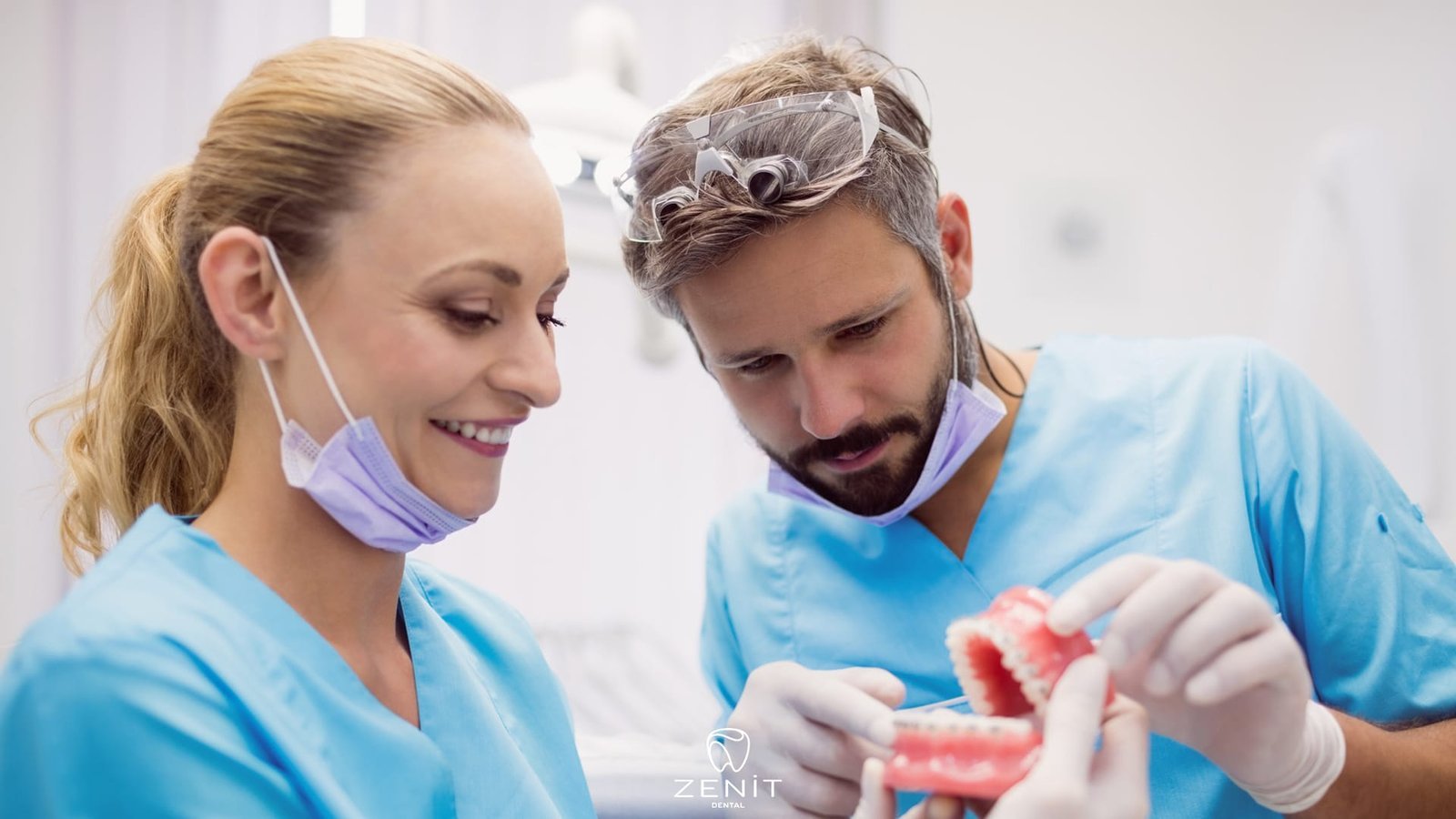Oral Care After Implantation
In today’s world, dental implants stand out as both an aesthetic and functional solution for replacing lost teeth. Dental implants not only provide an aesthetic appearance similar to natural teeth but also contribute to overall oral health by restoring chewing function. However, proper and effective oral care following implant surgery is crucial for optimizing the short-term healing process and ensuring the long-term health of the implant. In this comprehensive guide, you will find details to consider at each stage of post-implant oral care.
The First Days After Implant Surgery: Special Care Needs
The initial days following implant surgery require special care. Symptoms such as pain, swelling, and slight bleeding may occur after the surgical procedure, which is considered normal. However, these symptoms can be minimized with proper care.
- Use of Cold Packs: Ice or cold packs can be used to reduce swelling in the surgical area. However, they should be wrapped in a cloth to avoid direct contact with the skin.
- Mouthwash: Regular gargling with a mouthwash recommended by your doctor helps control the amount of bacteria in the mouth, reducing the risk of infection. Rest: Avoid excessive activity in the first days and prioritize rest. This can accelerate the healing process.
- Nutrition: Opt for soft foods and avoid extremely hot or cold foods. Consuming more liquid foods in the initial days can be soothing.
- Pain Management: Regular use of pain relievers recommended by your doctor can contribute to a comfortable healing process.
Sutures Care and Monitoring

Implant surgery typically involves the use of sutures. Proper care of the sutures can reduce the risk of infection and contribute to the successful healing of the implant.
- Avoid Touching the Sutures: It’s important to refrain from touching the sutures, and they should only be cleaned when necessary, as per your doctor’s recommendation. Touching them can lead to irritation and an increased risk of infection.
- Suture Dissolution: It’s normal for sutures to dissolve within the first few weeks. However, if there is an unexpected issue, it’s crucial to contact your doctor immediately.
- Don’t Neglect Check-ups: Regular check-ups by the doctor to monitor the sutures and the overall condition of the implant are essential. These check-ups are critical for evaluating the healing process and intervening if necessary.
- Pain and Swelling: Some level of pain and swelling in the initial days is normal. However, if these symptoms are excessively severe or persist for an extended period, seeking immediate medical attention is important.
Soft Foods and Special Dietary Considerations
After implant surgery, paying attention to food and beverage choices is crucial. In the first few days, consuming softer foods can help ease the discomfort of dental implants.
- Gentle Brushing: Gently brushing the teeth around the dental implant can prevent plaque buildup. However, care should be taken not to touch the sutured areas.
- Use of Mouthwash: Regular use of the mouthwash recommended by your doctor can assist in combating bacteria in the mouth.
- Avoid Smoking and Alcohol: Smoking and alcohol can negatively impact the healing process of the implant. Therefore, it is advisable to avoid these substances if possible.
- Hydration: Drinking plenty of water enhances oral cleanliness, supports overall health, and helps the body stay hydrated, contributing to the healing process.
Check-ups and Long-Term Care
Regular check-ups after implant surgery are crucial to assess whether the implant has successfully integrated.
- Doctor Check-ups: Your doctor will schedule periodic check-ups to assess the healing process of the implant and your overall oral health.
- Intraoral X-rays: Intraoral X-rays taken at specific intervals are effective in observing the integration of the implant with the bone. X-ray checks can assist in early detection of potential complications.
- Additional Tests if Necessary: Your doctor may request additional tests if needed to evaluate the condition of the implant. These tests can be performed to assess the health of the tissues surrounding the implant.
- Dental Hygiene Education: Receiving regular dental hygiene education from your doctor is important for long-term oral health. Proper brushing and flossing techniques can contribute to the long-term success of the implant.
- Protective Dental Habits: Avoiding detrimental habits like teeth grinding is crucial for the long-term success of the implant. Therefore, controlling such habits is important.

Long-Term Care for Implants and Daily Habits
Long-term success of dental implants is dependent on the patient’s daily oral care habits and regular visits to the dentist. Paying attention to the following points in the post-implant period contributes to the implant’s longevity.
- Regular Dental Check-ups: Regular check-ups by the dentist at intervals help in early detection of potential issues with the implants.
- Professional Cleanings: Undergoing professional dental cleanings at the frequency recommended by your dentist helps maintain gum health and monitors the health of tissues around the implant.
- Oral Hygiene: Daily oral care is crucial for cleaning the teeth around the implant and the interdental spaces. Proper brushing and flossing prevent plaque accumulation.
- Healthy Dietary Habits: Good nutrition positively impacts overall health and contributes to the successful integration of the implant.
- Avoiding Risk Factors: Avoiding risk factors such as smoking and excessive alcohol consumption can reduce potential complications that may negatively affect the long-term success of the implant.
- Use of Oral Protective Equipment: Using a mouthguard during teeth grinding or sports activities can help protect the implant from physical trauma.
Conclusion
This comprehensive guide thoroughly covers the important steps to consider at every stage of oral care following dental implantation. The care you invest in your implant will contribute to achieving a healthy smile in both the short and long term. A good oral hygiene practice will support the longevity of the implant and its harmonious interaction with surrounding tissues. By regularly implementing the recommendations in this guide, you can maintain a healthy mouth and preserve your smile. Remember that implant care may vary from person to person, so it is always best to follow your doctor’s recommendations.

Comments are closed